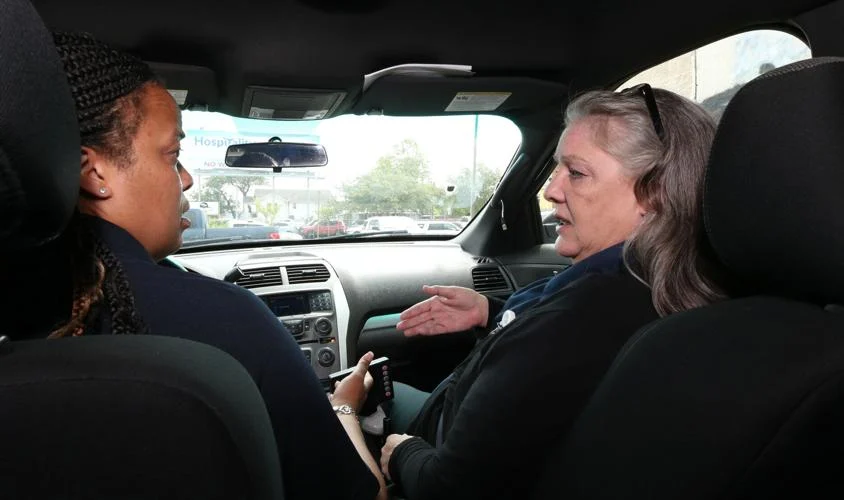On Thursday afternoon, she was sitting in the alley behind a gas station at 44th Street and Broadway, thinking about trying again. She called 911 and asked for help.
Unlike with such emergency calls in the past, this time a police officer, a fire department paramedic, and a clinician, all trained to help people in mental health crises, responded.
The team on Thursday was made of police officer Justin Owens, paramedic William Reed, and clinician Arielle Gray. All three have been with the mental health unit since March.
They were about two hours into their shift. It was the first call of the day.
The team on duty Thursday afternoon arrived in the alley behind the gas station about 10 minutes after the call.
“She attempted suicide last night in the Gulf and ended up in the hospital,” Owens said. “She got out of the hospital and made her way over here. She’s homeless and stays in a shelter. She’s having thoughts of suicide and going through a rough time.”
Gray sat next to the woman in the alley.
“She is likely keeping the woman calm, deescalating the situation, getting her to open up on what’s going on,” Owens said.
After about 30 minutes of calm conversation, the woman climbed into the back of a Galveston County Sheriff’s Office patrol car, and a county mental health deputy drove her off to get help.
Owens said that one benefit of having a mental health unit is employing methods other than restraining people at the scene and forcing them into a hospital against their will.
And such interactions are sadly common in Galveston and a big reason why the department needed a mental health unit, he said.
The department's first day of COAST was March 13, Lt. Renaye Ochoa, its commander, said.
“Our dispatchers were trained to triage mental health calls that were coming into the dispatch center,” Ochoa said. “Until that point, they didn’t really have the ability to put the folks into direct contact with resources.”
The department’s dispatchers have the ability to automatically transfer a mental health crisis caller to The Gulf Coast Center hotline, where trained clinicians could step in, Ochoa said.
While the mental health unit was on patrol, city officials, experts, and funders met at Galveston Fire Station No. 1 to discuss the city's new initiative.
Those who spoke at the meeting included Mayor Craig Brown, Police Chief Doug Balli, and Fire Chief Charles Olsen.
“We have a lot of people with mental health issues here in Galveston,” Olsen said. “This team has gone out and has started impacting our regular callers. They have already made a tremendous difference.”
At least 20 percent of police calls for service involve mental health or substance use issues, and for many departments, the demand for mental health response teams is growing, according to the American Psychological Association.
From March 13 to April 30, Galveston’s mental health unit received 114 calls requiring almost 90 hours of the unit’s time, according to the department’s data.
Seven of the 114 calls led to arrests, according to the department.
A call averages about 47 minutes, according to the data. Medical attention was provided at the scene during 21 calls, and 25 cases were resolved on the scene, according to the department.
Those who accept help from the mental health unit can be transported St. Joseph Medical Center in Houston for a psychiatric evaluation.
After the woman had met the mental health unit, she had agreed to receive treatment, something she has never done, Balli said.
“That’s just a fantastic success story,” Balli said. “The team is very compassionate about what they do. We’re very proud of them, and my hats off to them.”
Those who are experiencing emergencies can contact 911 or call 409-765-3702 for non-emergency regular dispatch.



NEWS
Hide Full Index
Show Full Index
View All News